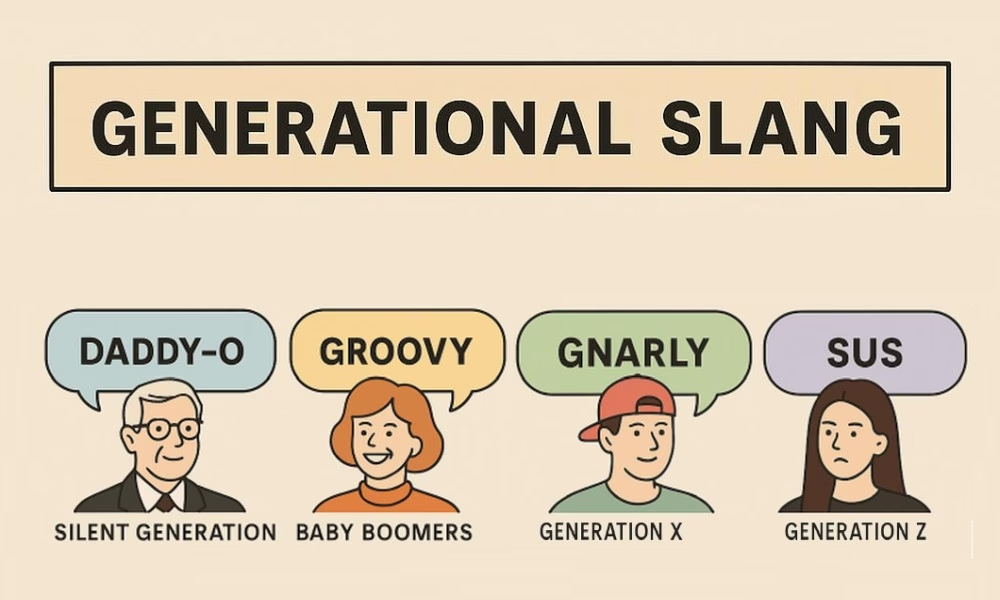
Why slang “belongs” to generations
Slang is like a secret handshake: it helps members of a group signal “you’re in,” and it shifts quickly so outsiders lag behind. Each generation, shaped by its technology, media, culture, and social stresses, invents or adopts new expressions to capture its mood and identity.
Because slang evolves fast, what once sounded fresh can age badly, or even become ironic. Someone from Generation Z might hear the slang of a Baby Boomer and think, “Whoa, grandpa, are you serious?”
Slang snapshots by generation
Silent Generation (born ~1928–1945)
This generation’s slang was modest, often borrowed from jazz, cinema, and youth culture.
- Daddy-o — a playful term of address
- Cruising for a bruising — asking for trouble
Baby Boomers (born ~1946–1964)
Boomers leaned into rock ’n’ roll, mass media, and counterculture.
- Groovy — cool or right on
- Square — someone uncool or conventional
- Threads — clothing
- Boob tube — television
- Split — to leave
- Ticked off — annoyed
- Dig it — to understand or enjoy
Generation X (born ~1965–1980)
Gen X carried a rebellious, ironic edge.
- Gnarly — extremely good or bad, depending on tone
- Phat — excellent
- This rocks — this is amazing
- Dude — a general term of address
- Homeslice — buddy or pal
- Chill pill — to calm down
- Crib — one’s home
- Bogus — false or unacceptable
Millennials / Gen Y (born ~1981–1996)
Millennials grew up with the internet, texting, and social media.
- BRB — Be Right Back
- OMG — Oh My God
- TBH — To Be Honest
- Bae — significant other
- Slay — to excel
- Adulting — doing grown-up responsibilities
- FOMO — Fear Of Missing Out
- Keeping it 100 — being honest
- Getting swole — working out, gaining muscle
Generation Z (born ~1997–2012)
Zoomers are digital natives, fluent in memes and fast-moving slang.
- Sus — suspicious or shady
- Cap / No cap — lie / no lie
- Capping — lying
- Cheugy — outdated or trying too hard
- Rizz — charisma
Generation Alpha (born ~2010 onward)
Still young, their slang is often meme-driven and ever-changing.
- Skibidi — a meme-based exclamation, playful nonsense
- Rizz — carried over from Gen Z
- Sigma / Beta — personality shorthand, often ironic
Why some slang sticks and some fades
Some slang disappears quickly, while other terms survive or re-emerge. Several factors affect this:
- Utility and expressiveness: slang that fills a gap (like FOMO) lasts longer.
- Media influence: songs, memes, or TV shows can make words spread quickly.
- Generational adoption: once older people start using it, young people often move on.
- Mutation: many slang words evolve or return with new meanings.
How to explore more slang
A great resource for contemporary slang is Urban Dictionary. Because entries are user-submitted, some are serious and others tongue-in-cheek, but it’s one of the best ways to track what’s current.
Another approach is simple observation: slang that survives is slang that people keep using, remaking, and sharing.
Generational slang is like a linguistic time capsule. Each phrase carries echoes of its era’s technology, humor, values, and social dynamics. Whether you’re decoding a TikTok comment or reminiscing about “groovy threads,” you’re witnessing the evolution of language in action.




